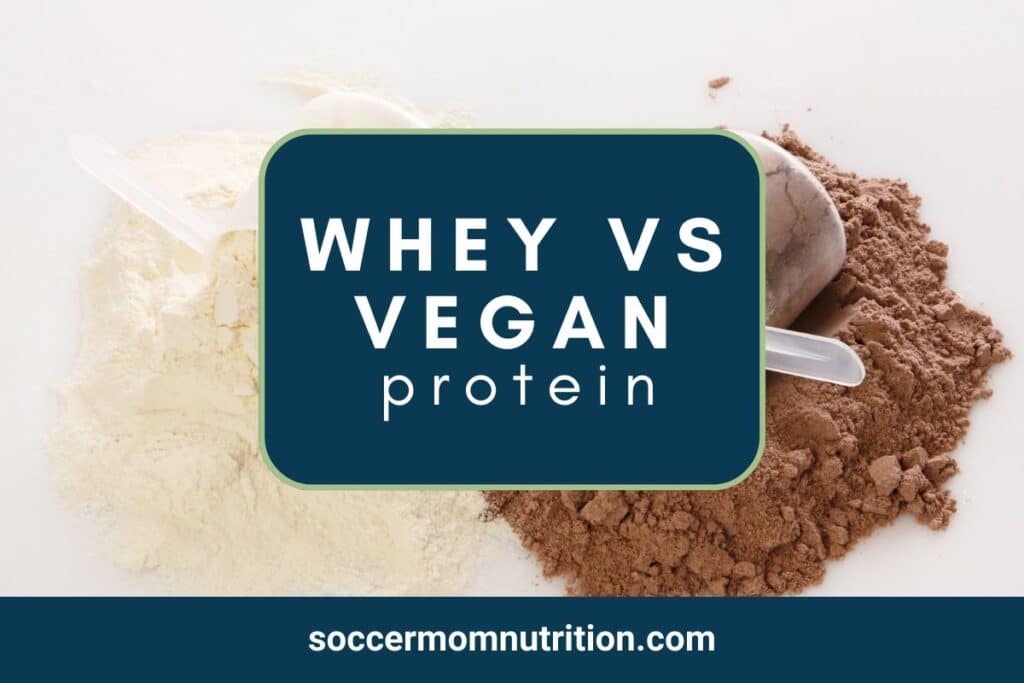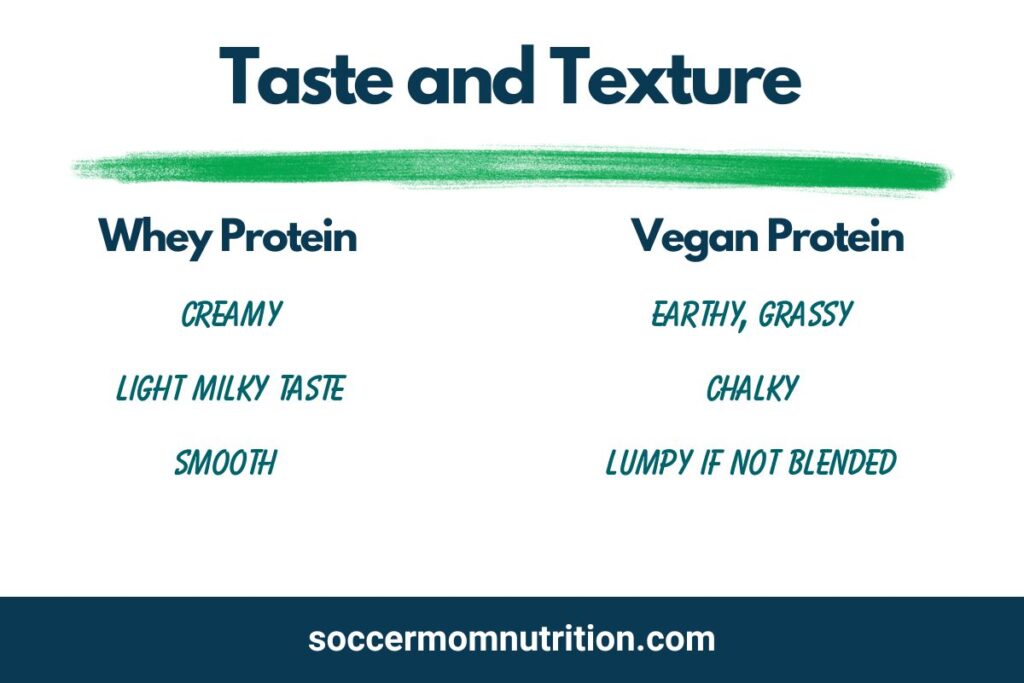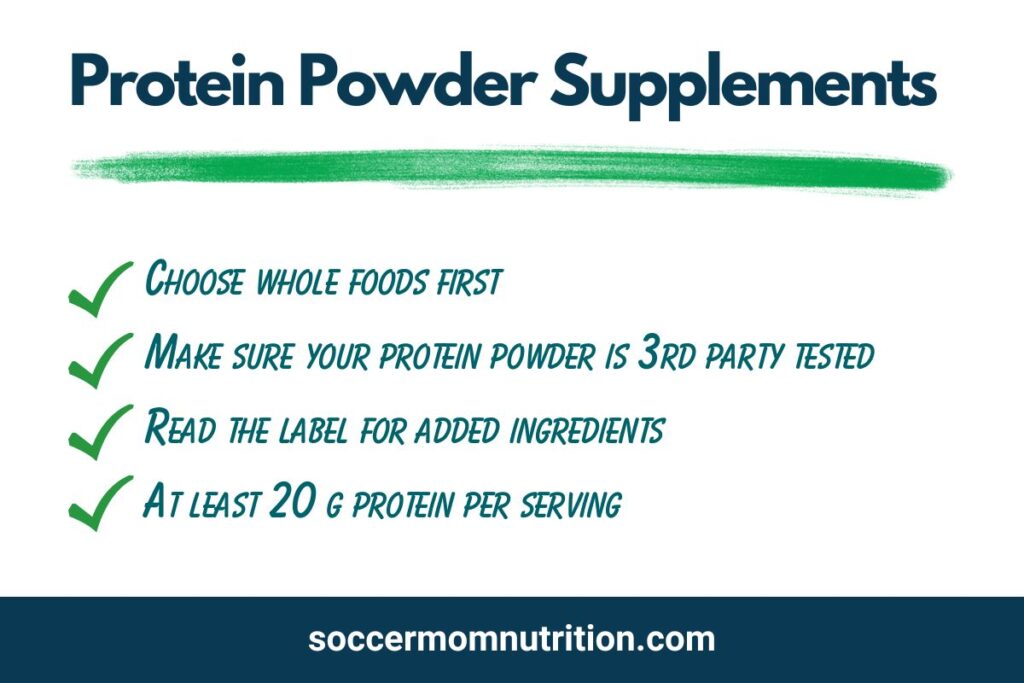Whey Protein vs Vegan Protein: Which One Meets Your Goals

If you are an athlete looking for different protein powders to include in your sports nutrition performance plan, build muscle, recovery and health, you may be wondering about the difference between whey protein vs vegan protein.
Whey protein and vegan protein are two of the most popular types of protein powders on the market, but they have different features to meet individual sports needs and preferences.
In this blog post, we will compare whey protein vs vegan protein sources, content, quality, safety, taste, texture and effects on athletic performance and health benefits.
We will also provide some tips on how to choose the best protein powder for you.
Where does a protein supplement fit
While it is possible to meet your protein needs from whole foods, such as meat, eggs, dairy, fish, soy, nuts, seeds and legumes, some athletes may find it hard or inconvenient to do so. This is where a protein supplement can come in handy.
A protein supplement provides a convenient, portable and concentrated source of protein that can be easily mixed with water or other liquids. It helps you meet your protein needs without adding excess calories, fat or carbohydrates to your diet.
However, not all protein supplements are the same. There are different types of protein powders available on the market, each with its own advantages and disadvantages. Two of the most common are whey protein and plant based protein.
What is whey protein
Whey protein is a type of protein that comes from a by product of cow’s milk. It has all nine essential amino acids that your body needs.
Whey protein powder has a high amount of leucine, a branched chain amino acid (BCAA) which may be the most important amino acid to support muscle growth, or muscle protein synthesis and preserving muscle. (1)
Whey protein is a fast-digesting protein. This means that it is available for your muscles quickly after you drink it. This makes it good for after exercise, to maximize the benefits of protein.
Whey protein comes in different forms, such as concentrate, isolate and hydrolysate.
The least processed form is whey protein concentrate and has some lactose (milk sugar) and fat in it.
Next, whey protein isolate has most of the lactose and fat removed. Finally, whey protein hydrolysate breaks down into smaller pieces for faster digestion.
What is plant protein
Vegan protein is a type of protein that comes from plants, such as pea, rice, soy, hemp, quinoa, chia and other plants. Some vegan protein powders have all nine essential amino acids, like soy and pea protein.
Others have some but not all, or a very low amount of them. But you can still get all the essential amino acids from plant protein by combining different sources, such as pea and rice, or soy and hemp. (2)
Vegan protein is less digestible protein probably due to its structure. (3)
Plant protein is considered a slow-digesting protein, meaning it is absorbed and used by your muscles more gradually than whey protein.
Plant protein powders come in different forms, such as isolates, concentrates and flours. Plant protein isolates are the most refined and have the highest protein content, usually around 80 to 90%.
Plant protein concentrates are less processed and have a lower protein content, usually around 50 to 70%. Plant protein flours are the least processed and have the lowest protein content, usually around 20 to 40%.
Whey protein vs vegan protein: how do they taste and feel
Another thing to think about when choosing between whey protein and vegan protein is how they taste and feel. This may be different depending on the brand, flavor, and quality of the product, but here are some general differences:
- Whey protein has a light and milky taste that can mix well with other things. It’s smooth and creamy and can make your smoothies more drinkable.
- Vegan protein has a more earthy, grassy, or nutty taste that may not be good for everyone. It may have a chalkier feel that results in a lumpy and less smooth drink.
But these differences can be made smaller by using a blender, adding more liquid or choosing a flavored product. You can also try different recipes and things to find the best mix for your taste buds.

Whey protein vs plant protein: how do they compare in quality and safety
Another factor to consider when choosing between whey protein and plant protein is their quality and safety. This may depend on several factors, such as:
- The source and processing of the protein
- The presence of contaminants or additives
- The certification by third-party testers
Whey protein and plant protein can vary in quality and safety depending on how they are produced and processed. Some methods may result in higher or lower protein content, amino acid profile, digestibility, bioavailability, and nutrient density.
Certain methods may also introduce contaminants or additives that may affect the purity and safety of the product.
Some examples of contaminants or additives that may be found in protein powders include:
- Heavy metals such as lead, arsenic, cadmium and mercury
- Pesticides and herbicides such as glyphosate
- Artificial sweeteners, colors, flavors and preservatives
These substances may have negative effects on your health if consumed in high amounts or over a long period of time. (4) They may also interfere with your athletic performance or drug testing if you are in a collegiate sport.
To ensure that you are getting a high-quality and safe protein powder, you should look for products that have been certified by third-party testers. These are independent organizations that verify the quality, purity, potency, and safety of supplements.
They also test for banned substances that may be prohibited by major athletic organizations.
Some examples of third-party testers that certify protein powders include:
These certifications can help you choose a protein powder that meets your standards and expectations. However, they are not mandatory or regulated by the FDA, so not all products have them.
You should also read the label carefully and look for reputable brands that use high-quality ingredients and follow good manufacturing practices.
Whey protein vs plant protein: the bottom line
Whey protein and plant protein are both popular types of protein powders that can help you meet your protein needs and support your athletic performance and health.
However, they have different characteristics that may make one more suitable for you than the other.
Whey protein is a complete animal-based protein that is fast-digesting and has a high biological value. It can help you stimulate muscle protein synthesis and recovery after exercise.
It also has a mild and smooth flavor and texture that can easily blend with other ingredients.
Plant protein is an incomplete plant-based protein that is slow-digesting and has a lower biological value. It can help you provide a sustained release of amino acids over time. It also has more fiber, antioxidants, phytochemicals, and minerals than whey protein.
The best choice for you may depend on your personal preferences, goals, needs, budget, and availability. You should also consider the quality and safety of the product and look for third-party certifications if possible.

Final thoughts
Ultimately, the best way to know which type of protein powder works best for you is to try them out yourself.
You can try different flavors, forms and doses of whey protein and vegan protein to see how they affect your performance, health, and taste. You may find that you like one more than the other, or that you can use both for different purposes.
Whatever you choose, remember that protein powders are supplements, not replacements. They should not take the place of a balanced and healthy diet that includes a variety of protein-rich foods.
Protein powders can help you get enough protein, but they cannot give you all the other benefits of eating whole foods.
We hope this article has helped you learn more about whey protein and vegan protein and how to choose the best one for you.
Stephanie Magill, MS, RD, CD, FAND has over 22 years of experience in public health and nutrition. As a performance registered dietitian nutritionist, Stephanie specializes in sports nutrition and provides simple and actionable information so that athletes can be well fueled for high performance on and off the field. Stephanie has a Master’s Degree in Nutrition and is a Fellow of the Academy of Nutrition and Dietetics.

